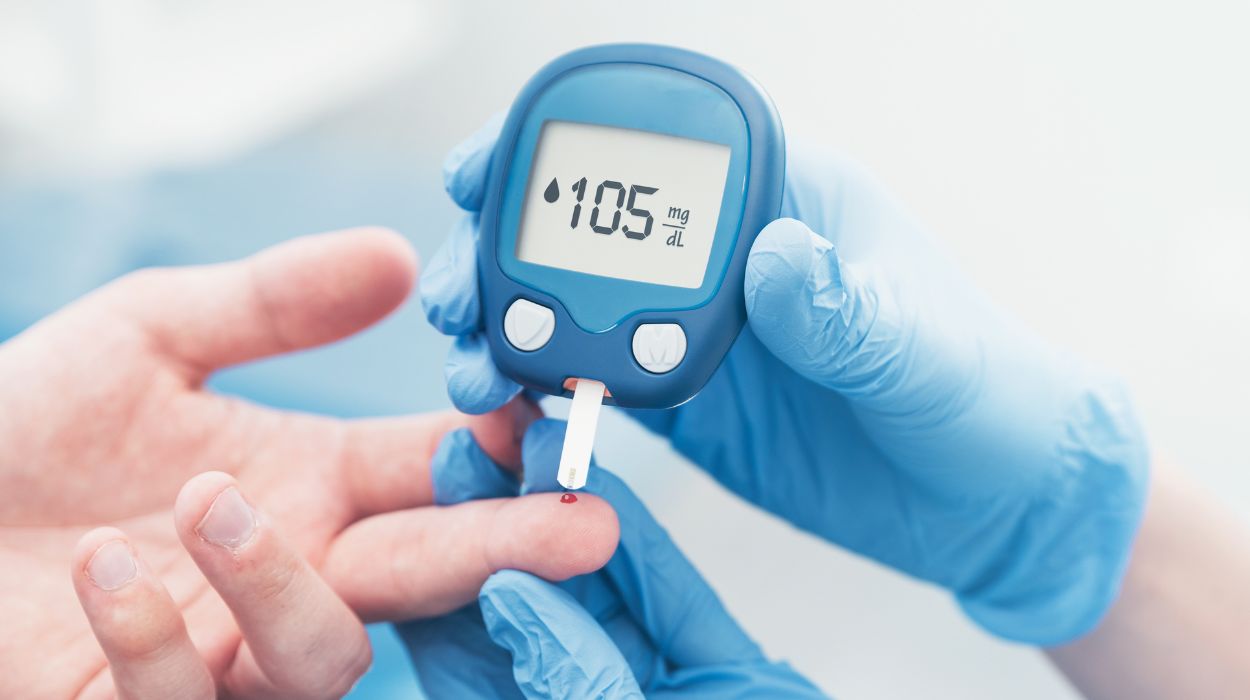 Expert's opinion
Expert's opinion
Expert's opinion
The article is a subjective view on this topic written by writers specializing in medical writing.
It may reflect on a personal journey surrounding struggles with an illness or medical condition, involve product comparisons, diet considerations, or other health-related opinions.
Although the view is entirely that of the writer, it is based on academic experiences and scientific research they have conducted; it is fact-checked by a team of degreed medical experts, and validated by sources attached to the article.
The numbers in parenthesis (1,2,3) will take you to clickable links to related scientific papers.
Does Diabetes Cause Hair Loss? Answer From Experts In 2024

Diabetes is a condition that affects over 422 million people[1] worldwide. It causes fluctuations in blood sugar levels and wreaks havoc on various bodily functions. From managing insulin levels to watching what we eat, we know the importance of controlling diabetes to avoid complications. So does diabetes cause hair loss?
While most of us are familiar with the typical symptoms and complications associated with diabetes, such as high blood sugar levels, fatigue, and nerve damage, one lesser-known effect can be equally distressing: hair loss.
Therefore, the answer is yes. This article will delve into the connection between diabetes and hair loss. We will see how diabetes reduces the absorption of nutrients by the hair and shed light on various treatment options to control hair loss.
Can Diabetes Cause Hair Loss?
Yes, diabetes can cause hair loss. Hair loss can be a symptom of both type 1 and type 2 diabetes. The primary causes of hair loss in people with diabetes are uncontrolled blood sugar levels, emotional and physical stress, and hormone imbalances.
Does Diabetes Cause Hair Loss?
Hair loss itself is not a definitive sign of diabetes. However, it is one of the many symptoms associated with the condition. Diabetes is characterized by the body’s inability to regulate blood sugar levels properly. This leads to high levels of glucose in the bloodstream. Both type 1 and type 2 diabetes can cause hair loss. Diabetes symptoms include:
- Frequent urination.
- Increased thirst.
- Constant hunger.
- Unexplained weight loss.
- Fatigue.
- Irritability.
- Blurred vision.
- Slow-healing sores.
There are many signs[2] of diabetes hair loss. First, people with type 1 diabetes are more prone to alopecia areata, where the immune system attacks hair follicles, resulting in losing hair in patches on the scalp and other body areas.
Also, due to insulin resistance as we see in type 2 diabetes[3] – hormonal imbalances, including increased production of androgens are seen. Elevated androgen levels are associated with a condition called androgenetic alopecia.[4] It is also known as male or female pattern baldness. This type of hair loss is characterized by gradually thinning hair on the scalp and can be exacerbated by diabetes.
Additionally, the stress[5] of managing diabetes can take a toll on the body. Stress contributes to hair loss by disrupting the normal hair growth cycle. The stress hormone cortisol puts follicle stem cells into an extended resting phase.
Hair typically goes through four phases: an active growing phase, a transition phase, a resting phase, and a phase where some resting hair falls out. Diabetes can disrupt this process, leading to slower hair growth and increased hair loss. It’s not limited to the scalp; a loss of hair can also occur on other body parts.
How Diabetes Impacts Your Hair
Diabetes can impact your hair in several ways. It affects its growth, strength, and overall health. Here are some ways diabetes can influence your hair:
Poor Blood Circulation
Uncontrolled blood sugar levels can damage blood vessels and impair circulation affecting hair follicle characteristics. Poor circulation, in turn, reduces the supply of oxygen and essential nutrients, such as biotin, to the hair follicles, resulting in weaker hair and, eventually, hair loss.
Nutritional Deficiencies
Diabetes can affect the body’s ability to absorb and utilize nutrients properly, and this can cause hair to become weak, brittle, and more prone to breakage. Underlying nutrient deficiencies may increase hair fragility and lead to hair loss.
For example, high-dose biotin therapy may not only improve alopecia areata, but it may help out-of-control diabetes[6] as well.
Hormonal Imbalances
Diabetes can cause imbalances in insulin, cortisol, and thyroid hormones. These imbalances disrupt the hair growth cycle, causing hair to fall out prematurely.
Stress
Living with diabetes can be emotionally and physically stressful, and this may cause an increase in the stress hormone cortisol. High cortisol levels can negatively affect the hair growth cycle, leading to hair loss.
Inflammation And Autoimmune Conditions
Diabetes can trigger chronic inflammation in the body. In some cases, this inflammation can affect the hair follicles, leading to a condition known as cicatricial alopecia. Additionally, diabetes can contribute to autoimmune disorders, such as alopecia areata, where the immune system mistakenly attacks the hair follicles, resulting in patchy hair loss.
Medications
Some prescription medications used to treat diabetes or its complications may have hair loss as a side effect. For example, cholesterol-lowering drugs can cause hair thinning[7] or loss. In addition, metformin may cause a B12 deficiency,[8] which, in turn, may cause noticeable hair loss. Studies show that men with male pattern baldness benefit less from taking metformin[9] than other males who may also be at high risk for type 2 diabetes.
How To Stop Hair Loss From Diabetes
Diabetes is not curable. Still, it can be adequately managed. Here is how to stop hair loss from diabetes:
Control Blood Sugar Levels

Maintaining good blood sugar control is essential for overall health. They can help prevent severe hair loss by ensuring proper circulation and nutrient supply to hair follicles.
Manage Stress
Stress can exacerbate hair loss in people with diabetes. Practice stress-reducing techniques such as meditation, yoga, or deep breathing exercises to help minimize the impact of stress hormones on your hair.
Eat A Balanced Diet
A healthy diet rich in vitamins, minerals, and proteins can support hair growth and overall health. Include lean proteins, fruits, vegetables, and whole grains. Ensure adequate biotin in your diet from foods such as carrots, almonds, and Swiss chard, or consider biotin supplements.
Use Medication
Sometimes, healthcare providers may prescribe hair loss treatment medications, such as minoxidil, to promote hair regrowth. Discuss these options with your healthcare provider to determine if they suit your situation.
Maintain Proper Scalp Hygiene

Keep your scalp clean and infection-free by washing your hair regularly with a gentle shampoo. This can help prevent scalp infections that may contribute to losing hair.
Consult Your Healthcare Provider
If you notice that your hair is growing slower than the usual rate or more hair is in your brush or drain, speak with your doctor about potential causes of lost hair and hair loss treatment options. They may recommend adjusting your medications or addressing underlying hormonal imbalances.
Consider Hair Care Products
Use gentle hair care products and avoid harsh treatments like chemical dyes, perms, and heat styling tools that can weaken hair and contribute to hair loss.
Other Effects Of Diabetes On Your Health
Aside from hair loss, there are numerous ways diabetes affects our health. Here are some commonly seen effects of diabetes:
- Heart Health: Diabetes can increase the risk of heart diseases, including stroke and high blood pressure. Elevated blood sugar levels, along with other factors like high cholesterol and triglyceride levels, contribute to the development of these conditions.
- Kidney Function: Diabetes is a leading cause of kidney disease. High blood sugar levels from uncontrolled diabetes can damage the blood vessels in the kidneys, impairing their ability to filter waste products and excess bodily fluids. Over time, this can produce microvascular impairment and other metabolic abnormalities leading to kidney failure[10] and the need for dialysis (or a kidney transplant).
- Eye Complications: Diabetes can cause various eye complications, including diabetic retinopathy, cataracts, and glaucoma. Elevated blood sugar levels can produce microvascular impairment in the retina, leading to vision problems and blindness if left untreated.
- Nerve Damage: Diabetes can cause nerve damage, known as diabetic neuropathy. It typically affects the feet and legs, and it can also affect other areas of the body. Symptoms may include tingling, numbness, pain, and a loss of sensation.
- Foot Complications: Diabetes can affect the blood flow and nerve function in the feet, increasing the risk of foot problems. Poor circulation can delay wound healing and increase the risk of infections. Nerve damage can decrease sensation, making it harder to notice injuries or ulcers.
- Mental Health: Living with diabetes can also impact mental health. The stress of managing the condition, coping with potential complications, and impacting daily life can contribute to increased stress, anxiety, and depression.
Due to these effects and possible complications, it is important to have a hands-on treatment of diabetes. Constant monitoring and lifestyle modifications are essential in the treatment of diabetes.
When To Seek Help From A Doctor
If hair loss persists or worsens, consider consulting with a dermatologist specializing in hair loss treatment. They can comprehensively evaluate, identify potential causes, and recommend specific treatments or interventions tailored to your needs.
Conclusion
Diabetes can cause hair loss, and it impacts both type 1 and type 2 diabetes patients. The primary factors contributing to hair loss in individuals with diabetes include uncontrolled blood sugar levels, hormonal imbalances, stress, and certain medications.
However, by effectively managing diabetes through blood sugar control, stress reduction, and proper hair care, it is possible to minimize or prevent hair loss.
+ 10 sources
Health Canal avoids using tertiary references. We have strict sourcing guidelines and rely on peer-reviewed studies, academic researches from medical associations and institutions. To ensure the accuracy of articles in Health Canal, you can read more about the editorial process here
- World (2023). Diabetes. [online] Who.int. Available at: https://www.who.int/news-room/fact-sheets/detail/diabetes
- Coogan, P.F., Bethea, T.N., Cozier, Y.C., Bertrand, K.A., Palmer, J.R., Rosenberg, L. and Lenzy, Y.M. (2019). Association of type 2 diabetes with central-scalp hair loss in a large cohort study of African American women. [online] 5(4), pp.261–266. doi:https://doi.org/10.1016/j.ijwd.2019.05.010.
- J. Jaime Miranda, Taype-Rondan, A., Tapia, J.A., Maria Gabriela Gastanadui-Gonzalez and Roman-Carpio, R. (2016). Hair follicle characteristics as early marker of Type 2 Diabetes. [online] 95, pp.39–44. doi:https://doi.org/10.1016/j.mehy.2016.08.009.
- Ola Ahmed Bakry, Abdel, M., Kamel, M. and Hassan, A.E. (2014). Androgenetic alopecia, metabolic syndrome, and insulin resistance: Is there any association? A case-control study. [online] 5(3), pp.276–276. doi:https://doi.org/10.4103/2229-5178.137776.
- Trüeb, R.M., Henry, J., Davis, M. and Schwartz, J.T. (2018). Scalp condition impacts hair growth and retention via oxidative stress. [online] 10(6), pp.262–262. doi:https://doi.org/10.4103/ijt.ijt_57_18.
- McCarty, M.F. (2016). In type 1 diabetics, high-dose biotin may compensate for low hepatic insulin exposure, promoting a more normal expression of glycolytic and gluconeogenic enyzymes and thereby aiding glycemic control. [online] 95, pp.45–48. doi:https://doi.org/10.1016/j.mehy.2016.08.002.
- Palmer, M.A., Liam Blakeborough, Harries, M. and Haslam, I.S. (2020). Cholesterol homeostasis: Links to hair follicle biology and hair disorders. [online] 29(3), pp.299–311. doi:https://doi.org/10.1111/exd.13993.
- and, M. (2022). Metformin and reduced vitamin B12 levels: new advice for monitoring patients at risk. [online] GOV.UK. Available at: https://www.gov.uk/drug-safety-update/metformin-and-reduced-vitamin-b12-levels-new-advice-for-monitoring-patients-at-risk
- Krysiak, R., Karolina Kowalcze and Bogusław Okopień (2021). Impaired metabolic effects of metformin in men with early-onset androgenic alopecia. [online] 74(1), pp.216–228. doi:https://doi.org/10.1007/s43440-021-00347-8.
- Krishnan, S., Suarez-Martinez, A.D., Pooneh Bagher, Gonzalez, A.L., Liu, R., Murfee, W.L. and Rajesh Mohandas (2021). Microvascular dysfunction and kidney disease: Challenges and opportunities? [online] 28(3). doi:https://doi.org/10.1111/micc.12661.



